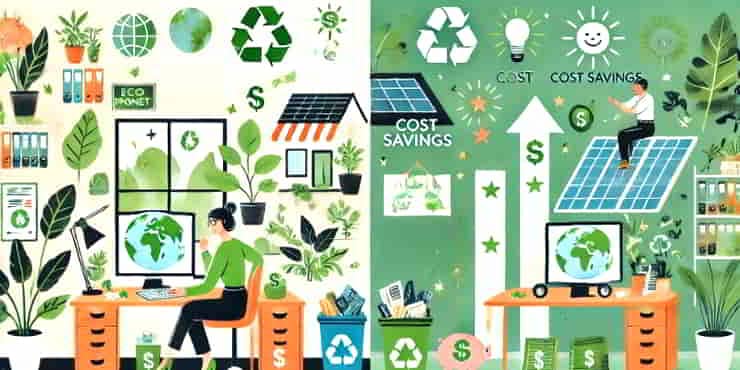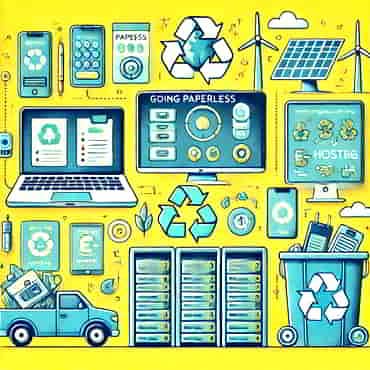Sustainable Business Ideas That Make Sense Today

Estimated reading time: 7 Min
| Purpose plus profit. Explore sustainable business ideas that are green, scalable, and aligned with the solopreneur life you want to lead. |
Sustainability is a necessity in our rapidly changing world.
For solopreneurs, adopting eco-friendly business practices can seem daunting, but the benefits are immense.
Not only can you contribute to a healthier planet, but you can also save money, attract eco-conscious customers, and enhance your brand image.
Why Sustainable Business Practices Matter
Traditional business practices often have significant environmental impacts, from excessive waste to high energy consumption.
Shifting to sustainable practices can mitigate these effects.
Sustainable businesses help reduce pollution, conserve natural resources, and promote biodiversity.
Moreover, customers today are more eco-conscious and prefer to support businesses that align with their values.
The environmental impact of traditional business practices includes excessive waste production, energy consumption, and resource depletion.
By adopting sustainable practices, solopreneurs can contribute to reducing these negative effects.
Sustainable businesses can lower pollution levels, conserve natural resources, and promote biodiversity.
As a result, they help create a healthier planet for future generations.
Customers are increasingly becoming more aware of environmental issues and prefer to support businesses that align with their values.
By adopting sustainable practices, solopreneurs can attract and retain eco-conscious customers, which can lead to increased brand loyalty and positive word-of-mouth marketing.
Additionally, sustainable businesses can differentiate themselves from competitors, opening up new market opportunities and enhancing their overall reputation.
Benefits of Eco-Friendly Business Practices for Solopreneurs
- Cost Savings
Reducing energy and resource consumption can lead to significant savings. By reducing energy consumption, solopreneurs can lower their utility bills and save money in the long run. For example, switching to energy-efficient lighting and appliances can reduce electricity costs. Other simple changes, like reducing paper use and opting for digital tools, can lower your operational costs. - Improved Brand Image
Businesses that prioritise sustainability often enjoy a better reputation. Customers appreciate and trust companies that care about the environment. Sustainable businesses are often perceived as more trustworthy and ethical. - Market Opportunities
Adopting sustainable practices can help solopreneurs stand out in a crowded market. By differentiating themselves from competitors, sustainable businesses can attract customers who prioritise eco-friendly products and services. This can lead to new market opportunities and increased revenue. - Personal Well-being
Cleaner air, fewer toxins, and a healthier environment benefit everyone. Sustainable practices can contribute to a healthier work environment by reducing exposure to harmful chemicals and toxins. This can lead to improved personal well-being and increased productivity. Additionally, knowing that your business is contributing to a healthier planet can provide a sense of fulfilment and satisfaction.
Practical Tips for Implementing Sustainability in a Solo Business
1. Reduce, Reuse, and Recycle
- Reduce Waste
Solopreneurs can start by assessing their current waste production and identifying areas where they can reduce waste. For example, they can minimise packaging by using reusable containers or opting for minimal packaging. Avoiding single-use plastics, such as plastic bags and straws, can also help reduce waste. Additionally, printing only when necessary and opting for digital documents can significantly reduce paper waste. - Reuse Materials
Solopreneurs can look for ways to reuse materials and products in their business operations. For example, they can use durable goods that have a longer lifespan, repurpose old items for new uses, and donate or sell things they no longer need. This can help reduce waste as well as save money on purchasing new items. - Recycle
Familiarise yourself with local recycling guidelines. Setting up a comprehensive recycling system can help solopreneurs manage their waste more effectively. They can recycle paper, plastics, metals, and electronics, ensuring that their waste is properly sorted and disposed of. This can help reduce the amount of waste sent to landfills and contribute to a more sustainable business.
2. Energy Efficiency
- Reduce Energy Consumption
Solopreneurs can reduce their energy consumption by making simple changes in their daily operations. For example, they can turn off lights and electronics when not in use, use energy-efficient bulbs, and invest in energy-saving appliances. These changes can help lower energy bills and reduce their overall environmental impact. - Renewable Energy
Switching to renewable energy sources can significantly reduce a solopreneur’s carbon footprint. Consider installing solar panels to generate their own electricity or switching to a green energy supplier that provides renewable energy. This can help reduce your reliance on fossil fuels and contribute to a more sustainable business. - Smart Thermostats
Using smart thermostats can help solopreneurs control their heating and cooling more efficiently. Smart thermostats can automatically adjust the temperature based on occupancy and preferences, helping to reduce energy consumption and save money on utility bills.
3. Sustainable Sourcing
- Eco-friendly Suppliers
Choose suppliers committed to sustainable practices. You can look for certifications like Fair Trade, organic, or Energy Star, which indicate that the products and services meet certain environmental and ethical standards. By choosing eco-friendly suppliers, solopreneurs can support sustainable practices and reduce their overall environmental impact. - Local Sourcing
Supporting local businesses can help solopreneurs reduce transportation emissions and boost their local economies. By sourcing products and services locally, solopreneurs can reduce the carbon footprint associated with transportation and support their local community. - Sustainable Products
Solopreneurs can choose products made from recycled or sustainable materials to reduce their environmental impact. For example, they can opt for office supplies made from recycled paper or furniture made from sustainably sourced wood. This can help reduce waste and support sustainable practices.
4. Digital Practices
- Go Paperless
You can use digital tools for invoicing, note-taking, and project management to reduce paper waste and save trees. This not only saves trees but also reduces clutter. In addition, going paperless can help solopreneurs improve efficiency. - Eco-friendly Web Hosting
Choose web hosting services powered by renewable energy. Choosing eco-friendly web hosting services can help solopreneurs reduce their carbon footprint. Find hosting providers who are committed to being powered by renewable energy and to sustainability. - Manage e-waste
Properly managing e-waste is essential for a sustainable business. Solopreneurs can recycle old electronics and responsibly dispose of batteries and other hazardous materials to reduce their environmental impact. Look for local e-waste recycling programmes and follow proper disposal guidelines.
5. Green Marketing

- Promote Your Practices
Let your customers know about your sustainability efforts through your website, social media, and marketing materials. Promoting sustainable practices can help solopreneurs attract eco-conscious customers and build a positive brand image. - Eco-friendly Packaging
Use recyclable or biodegradable packaging materials. Using eco-friendly packaging materials can help solopreneurs reduce waste, appeal to eco-conscious customers, and minimise their environmental impact. - Green Shipping
Offering carbon-neutral shipping options can help solopreneurs reduce the environmental impact of their shipping practices. They can also encourage customers to place bulk orders to reduce transportation emissions and improve efficiency.
Challenges and Solutions
Implementing sustainability can be challenging, especially for solopreneurs with limited resources.
Common challenges include higher upfront costs for sustainable products and difficulty finding reliable, eco-friendly suppliers.
However, these challenges can be overcome with careful planning and incremental changes.
Start small, prioritise high-impact actions, and seek out grants or subsidies for sustainable initiatives.
For example, solopreneurs can start by making small changes in their daily operations, such as reducing energy consumption and waste.
They can also prioritise high-impact actions, such as switching to renewable energy sources or choosing eco-friendly suppliers.
Additionally, they can seek out grants or subsidies for sustainable initiatives to help offset the upfront costs.
Case Studies and Success Stories
Example 1: Green Thumb Designs
Green Thumb Designs, a solo graphic design business, switched to 100% recycled paper for all printed materials and transitioned to a fully digital workflow.
These changes reduced their carbon footprint and attracted eco-conscious clients, boosting their revenue by 20%.
Example 2: EcoTech Solutions
EcoTech Solutions, a one-person IT consultancy, installed solar panels to power their home office and chose a green web hosting provider.
These efforts not only lowered their energy bills but also positioned them as a leader in sustainable IT solutions.
FAQs: Sustainable Business Ideas
What are some simple first steps to make my business more sustainable?
Start by reducing waste, conserving energy, and choosing eco-friendly suppliers.
How can I reduce the carbon footprint of my solo business?
Use renewable energy, reduce travel, and choose sustainable products and services.
Are sustainable business practices cost-effective for solopreneurs?
Yes, many sustainable practices can save money in the long run through reduced resource consumption and increased efficiency.
What are some eco-friendly marketing strategies for solopreneurs?
Use digital marketing, eco-friendly packaging, and green practices to attract like-minded customers.
How can I measure the impact of my sustainable practices?
Track key metrics such as energy consumption, waste reduction, and customer feedback on sustainability efforts.
Summary
Sustainable business practices are not just for large corporations.
As a solopreneur, you have the flexibility to make meaningful changes that benefit both your business and the planet.
Don’t try to do it all at once.
Start small, stay committed, and watch as your eco-friendly efforts lead to a healthier environment, happier customers, and a more profitable business.
Let us know how you get along!
😉
Richard



![Are Wealthy Affiliate Hubs Revolutionising Website & Content Development In [year]? A futuristic and sleek digital workspace designed for website management and content creation - Wealthy Affiliate Hubs](https://ml0yvzumdtic.i.optimole.com/cb:k6B_.1fa14/w:740/h:370/q:mauto/https://solobusinessmind.com/wp-content/uploads/2024/12/A-futuristic-and-sleek-digital-workspace-designed-for-website-management-and-content-creation-Wealthy-Affiliate-Hubs740x370-O.jpg)


